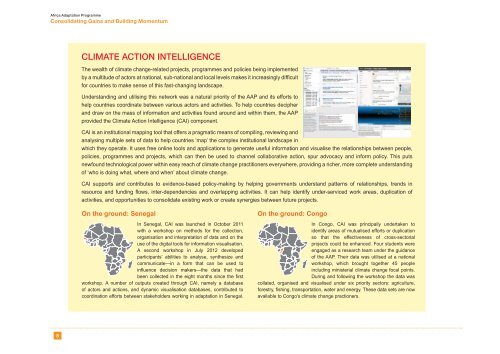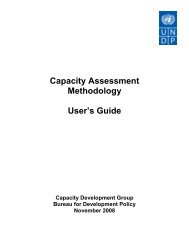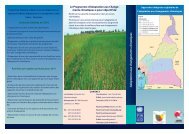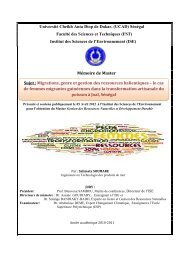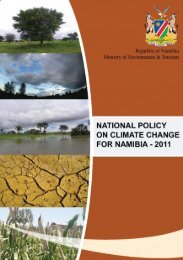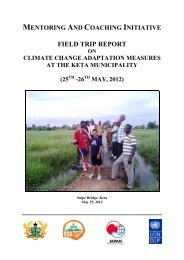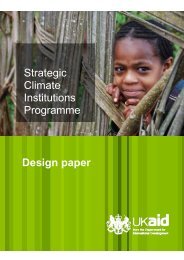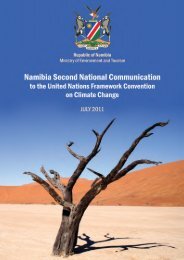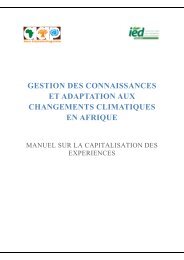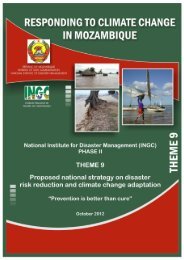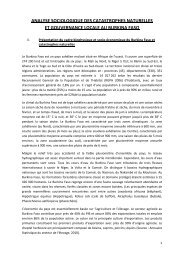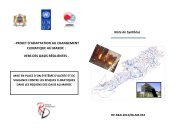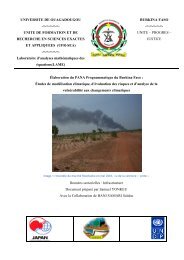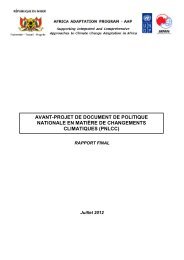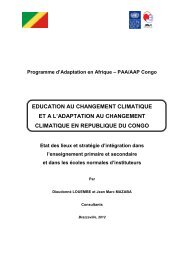Consolidating Gains and Building Momentum.pdf - Africa Adaptation ...
Consolidating Gains and Building Momentum.pdf - Africa Adaptation ...
Consolidating Gains and Building Momentum.pdf - Africa Adaptation ...
- No tags were found...
You also want an ePaper? Increase the reach of your titles
YUMPU automatically turns print PDFs into web optimized ePapers that Google loves.
<strong>Africa</strong> <strong>Adaptation</strong> Programme<strong>Consolidating</strong> <strong>Gains</strong> <strong>and</strong> <strong>Building</strong> <strong>Momentum</strong>CLIMATE ACTION INTELLIGENCEThe wealth of climate change-related projects, programmes <strong>and</strong> policies being implementedfor countries to make sense of this fast-changing l<strong>and</strong>scape.Underst<strong>and</strong>ing <strong>and</strong> utilising this network was a natural priority of the AAP <strong>and</strong> its efforts tohelp countries coordinate between various actors <strong>and</strong> activities. To help countries decipher<strong>and</strong> draw on the mass of information <strong>and</strong> activities found around <strong>and</strong> within them, the AAPprovided the Climate Action Intelligence (CAI) component.CAI is an institutional mapping tool that offers a pragmatic means of compiling, reviewing <strong>and</strong>analysing multiple sets of data to help countries ‘map’ the complex institutional l<strong>and</strong>scape inwhich they operate. It uses free online tools <strong>and</strong> applications to generate useful information <strong>and</strong> visualise the relationships between people,policies, programmes <strong>and</strong> projects, which can then be used to channel collaborative action, spur advocacy <strong>and</strong> inform policy. This putsnewfound technological power within easy reach of climate change practitioners everywhere, providing a richer, more complete underst<strong>and</strong>ingof ‘who is doing what, where <strong>and</strong> when’ about climate change.CAI supports <strong>and</strong> contributes to evidence-based policy-making by helping governments underst<strong>and</strong> patterns of relationships, trends in activities, <strong>and</strong> opportunities to consolidate existing work or create synergies between future projects.On the ground: SenegalIn Senegal, CAI was launched in October 2011with a workshop on methods for the collection,organisation <strong>and</strong> interpretation of data <strong>and</strong> on theuse of the digital tools for information visualisation.A second workshop in July 2012 developedparticipants’ abilities to analyse, synthesize <strong>and</strong>communicate—in a form that can be used to workshop. A number of outputs created through CAI, namely a databaseof actors <strong>and</strong> actions, <strong>and</strong> dynamic visualisation databases, contributed tocoordination efforts between stakeholders working in adaptation in Senegal.On the ground: CongoIn Congo, CAI was principally undertaken toidentify areas of mutualised efforts or duplicationso that the effectiveness of cross-sectorialprojects could be enhanced. Four students wereengaged as a research team under the guidanceof the AAP. Their data was utilised at a nationalworkshop, which brought together 45 peopleincluding ministerial climate change focal points.During <strong>and</strong> following the workshop the data wascollated, organised <strong>and</strong> visualised under six priority sectors: agriculture,available to Congo's climate change practioners.8


